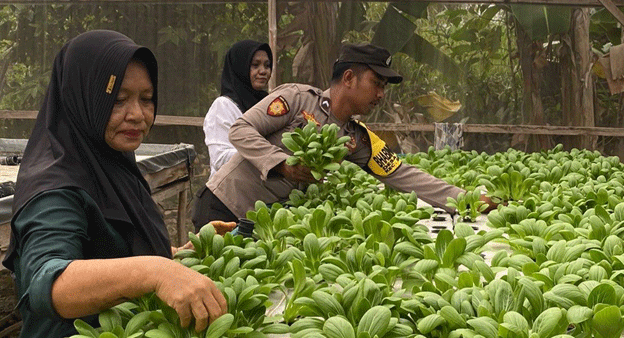In an era where food security and sustainable agriculture are more important than ever, innovative solutions are being explored to meet these challenges. A recent example comes from Bripda M. Abdul Rizki, a Bhabinkamtibmas (community police officer) in Desa Pulau Baran, Kecamatan Senayang, who has actively engaged his community in hydroponic vegetable farming. This project aims to establish a self-sufficient village with a sustainable food supply, demonstrating the potential of hydroponics in rural settings.
The Power of Hydroponics in Rural Development
Hydroponic farming, which allows for the growth of plants without soil by using nutrient-rich water solutions, is gaining popularity worldwide. According to a report from the Food and Agriculture Organization (FAO), hydroponic systems can produce crops with 20-25% more yield than traditional farming methods, and they require up to 90% less water. In Indonesia, where agricultural land is increasingly under pressure from urbanization and climate change, hydroponics presents an effective alternative to traditional farming.
Bripda Rizki’s hydroponic garden, which focuses on growing bok choy (sawi), exemplifies how this method can be integrated into local agricultural practices. Alongside community members, Rizki not only participates in the harvesting but also oversees watering, fertilization, and the application of vitamins to the crops. This hands-on involvement helps to educate local farmers about modern agricultural techniques and enhances community engagement.
Community Support and Economic Benefits
The efforts of Bripda Rizki have received strong backing from local authorities, including IPTU Hendri, the head of the Senayang police precinct. He emphasizes that these activities are part of a broader strategy to develop the potential of local communities and promote positive initiatives for sustainable self-sufficiency. This is crucial for enhancing the economic prospects of the village and improving overall living standards.
The local police department’s involvement illustrates a commitment to supporting community development and food security initiatives. The harvest of bok choy not only provides nutritious food for the village but also opens up new avenues for income generation. Excess produce can be sold in local markets, contributing to the economic upliftment of the community.
The hydroponic farming initiative led by Bripda M. Abdul Rizki highlights the critical role that innovative agricultural practices can play in enhancing food security and community resilience in rural Indonesia. By fostering local engagement and demonstrating the viability of modern farming techniques, this project not only addresses immediate nutritional needs but also empowers communities to take charge of their agricultural potential. As food insecurity becomes an increasingly pressing issue, the lessons learned from Desa Pulau Baran could serve as a model for similar initiatives throughout the region.












